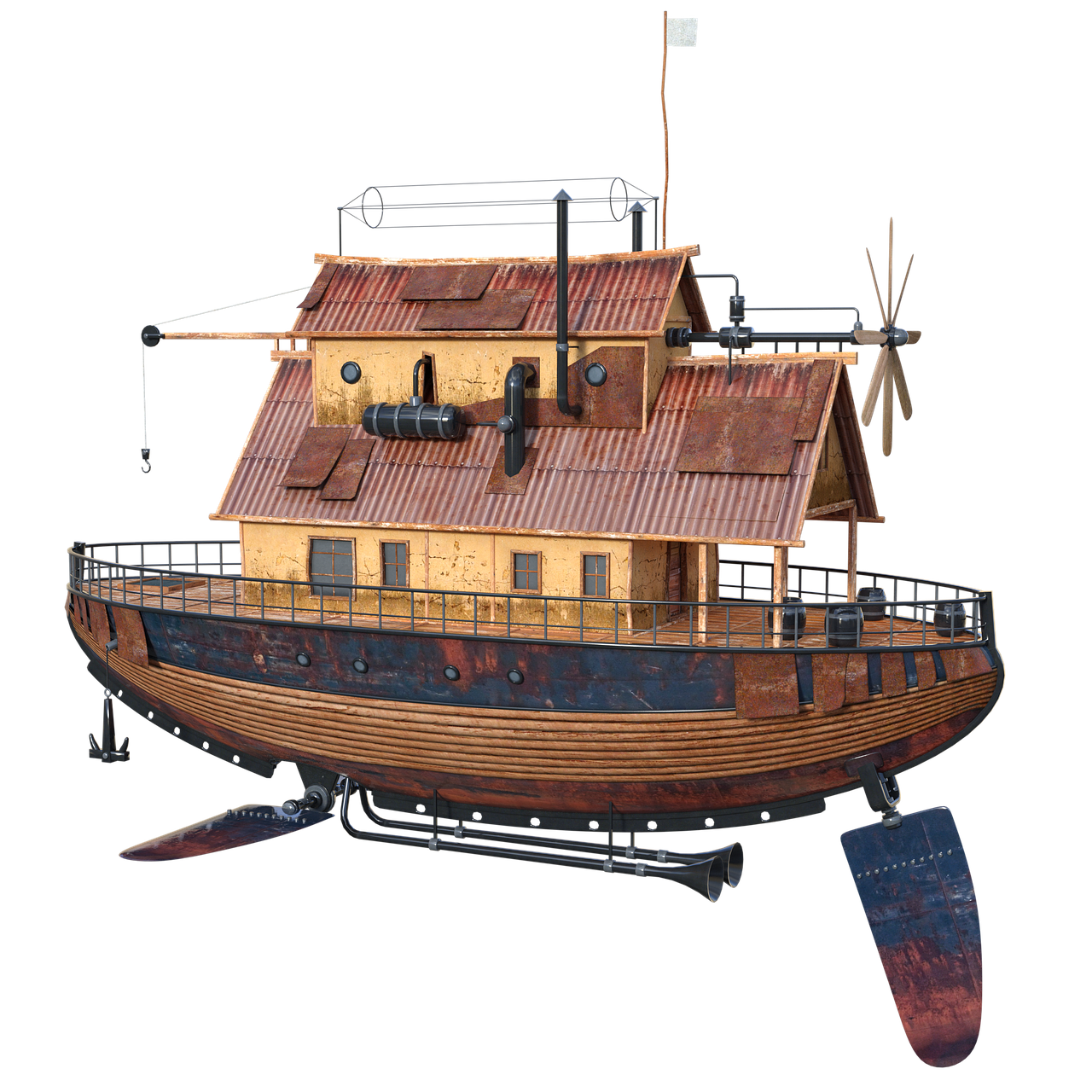Line by Lion Publications has picked up my post-apocalyptic novel, The Great Disruption. They’ve given it a great new cover by their house artist, Thomas Lamkin Jr., but it’s the same book. It’s been a pleasure working with Amanda Lamkin at Line by Lion, and I’m looking forward to working with them for future projects.
Excerpt from “The Dancer and the Pirate”
Chapter 7: A Midnight Call
Larry has been staying with Allen for about a week and a half at this point. Larry’s mom, Amelia has started going to AA meetings and her and Larry’s relationship is beginning to improve. Larry will soon be starting back at college and will move into the dormitory at that point.
You can check out the book on Amazon from the link below.
amazon.com/author/www.sksmithwriter.com
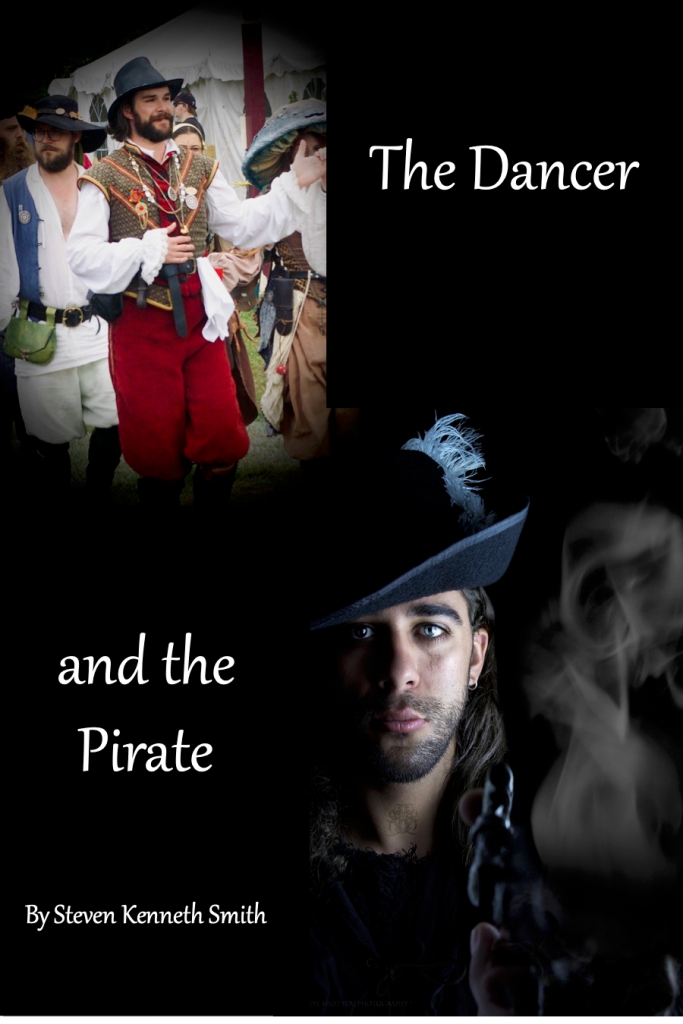
Tuesday night Allen came home to find Larry had outdone himself for dinner. Herbed, roasted chicken breasts, baked sweet potatoes, and broccoli spears dusted with grated parmesan. A pie sat on the counter. Allen raised his eyebrows. “You baked a pie, too?”
“I got the pie at the supermarket. It’s apple. I hope you like that kind.”
“Yeah. Apple is great. This is quite a surprise.” He shot a glance to the table. Larry had set out candles this time. “What’s the occasion?”
Larry cut open the sweet potatoes and added butter. “A couple of things. Got a call from Mom, and she’s still doing well, at least as far as I can tell. She sounded good. And I got notice that my application for a room in the honors dorm was approved.”
“That’s awesome, Larry. On both counts.”
Larry set two plates to the table and lit the candles. “Dinner is served.”
“Okay, thanks. Uh—I need to wash up. I’ll be right back.” As he went down the hall to the bathroom the thought hit him full force that Larry would be leaving soon. Of course, he knew that, but he’d gotten used to him being here, and he liked being with him. And Larry was a better cook than he.
While he soaped his hands it occurred to him that this was the first time he could remember that his initial thoughts regarding one of his contacts wasn’t about sex.
***
Larry fell asleep right after they’d made love that evening, even though it was still early. Allen had been submissive, but responsive, just as he liked, and he tried to be attentive to Allen’s needs as well. Allen’s happy cries as they coupled encouraged him that he’d succeeded. After they disengaged he kissed Allen, and his response to his kiss gave him every confidence that he’d satisfied him. They drifted off to sleep in each other’s arms.
Some time later his phone rang. He checked Allen’s clock-radio. 11:32.
Allen stirred as Larry swung out of bed and found his phone in the pile of his clothes on the floor. It had gone to voice-mail by that time. The caller ID said, “Mt Sinai Hospital ER.” Oh shit. He hit the “Call Back” button on the screen. A couple of seconds passed. Then: “Hello, emergency room desk.”
“This is this Larry Johnson, returning your call.”
“Just a moment.—Is your mother’s name Amelia Johnson?”
An icicle stabbed his heart. He sat down on the edge of the bed. “Yes.”
“Your mother was just admitted to the emergency room. She was in an automobile accident and is in serious condition. You should get here as soon as possible.”
“Oh my God!”
Allen bolted upright behind him.
“I’ll be there as soon as I can,” Larry said. “Was she—” He gulped. “—Was she drinking?”
“I don’t have that information. The doctor will fill you in when you get here. Come in through the Emergency Room entrance and check in at the desk. Mt. Sinai Hospital, 350 West Main Street, in Clairsville.”
“Yeah. Right.” Larry disconnected and slid out of bed. He searched in the darkness for his clothes. “Shit, oh shit, goddammit, shit.”
Allen crawled across the bed and turned on the light. “What happened?”
“Mom was in a car wreck and is in the hospital in Clairsville. Mt. Sinai ER. They need me there now. Goddammit, I’m fucking two hours away!” Larry had the wrong foot in his pants leg. He kicked it out and tried again.
“I know where that is,” Allen said. “I’ll drive you. My car’s more reliable.” He slid out of bed and pulled on his trousers.
***
Allen crowded the speed limit by 5 to 10 miles per hour or more all the way to Clairsville. Larry didn’t speak much, but he fidgeted in his seat beside him the whole way. Allen concentrated on driving. He reflected that before Larry had been staying with him he would have likely had at least two or three drinks under his belt by now. He might have still tried the trip under the circumstances, but he was glad he didn’t have to do it impaired.
They pulled up to the ER entrance at 1:16 by the dashboard clock. Larry said, “Thanks,” and jumped out of the car. He ran into the building without further comment. Allen pulled through the drop-off spot and went to park.
By the time he walked back to the ER from the parking lot Larry was nowhere visible. He looked around a moment, then headed to the reception desk. A middle aged woman with graying black hair looked up at him as he approached.
“May I help you?”
“I’m Allen Stewart, here for Amelia Johnson.”
She consulted her screen. “Her son was just here. Are you a relative?”
“I’m—uh—Larry’s partner.”
“He’s in a consultation room with a social worker. I’ll buzz her. Allen Stewart, you said?”
“Yes.”
Allen expected her to call her on the phone, but instead she typed on her keyboard for a moment and hit the “return” key with a decisive clack of her little finger.
“It might take a little bit before she responds,” the receptionist said, “I’ll call you when she messages me back. Have a seat.”
Allen headed toward the seats in the waiting area, but before he sat the receptionist said, “Mr. Stewart, you can go back.” He turned around and she pointed toward a door in the back of the room. “Consultation room C.”
***
Larry had a box of tissues in his lap and had a couple of them clenched in his fist. He and another woman looked up when he opened the door. Allen laid a hand on Larry’s shoulder. “How is she?”
“She’s in surgery. Lost a lot of blood, and her left leg is badly broken. Complex fracture. They said—” he sniffled and wiped his eyes. “—they said she might lose it.”
“But she’s going to live?”
“Yeah. Probably.” He tilted his head toward the social worker. “They won’t commit to anything.”
“Of course they won’t,” Allen said. “They don’t know enough yet. We have to wait for the surgery to finish, and to see how she heals.”
Larry nodded and wiped his eyes. He shook his head. “All those times she drove drunk and got away with it, and this time she was sober, coming back from an AA meeting, and—and some goddamn drunk ran a red light and T-boned her car.”
Allen sat beside him and gave him a tight hug. “We’ll get through this. It’ll be okay.”
Larry nodded as best he could with his head pressed against Allen’s shoulder, sobbing.
Allen turned to the social worker while still embracing Larry. “How’s the other driver?”
She closed her eyes for a moment and pursed her lips. “I can’t tell you that.”
Allen looked her in the eyes. “He’s dead, isn’t he?”
She closed her eyes again. She shook her head. “I can’t tell you that.”
Allen grimaced and rolled his eyes. “Yeah. I understand. Thanks for letting us know.”
Larry sobbed anew, his face still buried in Allen’s shoulder.
***
It was almost four in the morning when someone came to the surgical waiting room and summoned Larry to another consultation room. Larry had just dropped off to sleep less than an hour earlier but he came awake instantly when Allen tapped his shoulder.
“Your mother’s out of surgery,” the social worker said, a different one than the one they’d seen before. The room she led them to was smaller and more spartanly furnished than the one downstairs, but it had light panels attached to the wall for viewing x-ray films. Allen took the seat farthest from the door and they settled into the molded plastic chairs.
After a couple of minutes a man came in wearing green surgical scrubs dotted with blood stains. His surgical mask hung beneath his chin. Allen and Larry stood. The doctor closed the door behind himself and waved them back down to their seats. He took a seat himself.
“Hi. I’m Dr. Callan. I’m an orthopedic surgeon. Which one of you is Amelia’s son?”
Larry raised his hand. “Me.”
Dr. Callan focused on Allen. “And you are…?”
“Allen Stewart. I’m Larry’s partner.”
Dr. Callan raised an eyebrow and turned back to Larry. “Are you okay with him being here?”
Larry shot a glance to Allen, eyebrows raised, then looked back to Dr. Callan. He nodded. “Yes.”
Dr. Callan lowered his chin momentarily. He pulled the mask off his face and crumpled the green skullcap he wore into his fist. He ran his fingers through his graying hair, and sighed. “Okay. I think she can keep her leg.”
Larry and Allen heaved sighs, but Dr. Callan raised a hand to stop them. “She’s going to have a long period of rehabilitation though. Her femur was broken in multiple places, and she had some extensive soft tissue damage to her thigh muscles. We had to reconnect some blood vessels,and piece her femur—her thigh bone—back together. It’s going to take a while until the bones knit.
“I won’t sugarcoat this, Mr. Johnson. She might eventually decide it’s better to have an artificial leg than the damaged real leg. It’s going to be painful, difficult, and it’s going to take a long time to heal. If it ever does. Even if she does heal there’s almost no chance she’ll regain all of her original function. She’ll always walk with a limp, best case; or she’ll have to use a walker.”
Larry turned to face Allen for a second, then turned back to the doctor. He opened his mouth, but the doctor spoke first.
“You don’t have to make a decision now, and you shouldn’t. What I’ve done so far preserves her prospects going forward. She can make her decision about long term options later.”
Larry nodded, tight-lipped. “Thank you.”
“Aside from her broken leg she has some lacerations on her left arm, her neck, and her face, some of which had to be sutured, but those were relatively minor in comparison. She’ll be in recovery for a while yet, and then they’ll move her to a room. You can see her then, but she’ll be sort of groggy for some time. I also want to prepare you: she’ll look pretty scary, but considering what she’s been through, she’s in good shape.”Dr. Callan stood and clasped Larry’s shoulder. “Best wishes.” He left the room.
Larry turned his face to Allen. He met his eyes for a moment, lowered them, sighed, and lifted his gaze to Allen’s again. “My partner, eh?”
“Larry, I’m sorry. I wanted to support you and I was afraid they wouldn’t—”
Larry pressed his fingers over Allen’s mouth. “It’s okay. I appreciate your support, and I understand why you said that.” He lowered his hand. “I sort of like the idea of being your partner. I hope—” He wiped his eyes “—I hope I can continue being your partner after we leave the hospital.”
Allen wrapped his arms around him. “Of course you can.”
Larry returned his embrace. “Thank you.” He sniffled and wiped his nose with the back of his hand. “Oh God, thank you so much.”
The Dancer and the Pirate
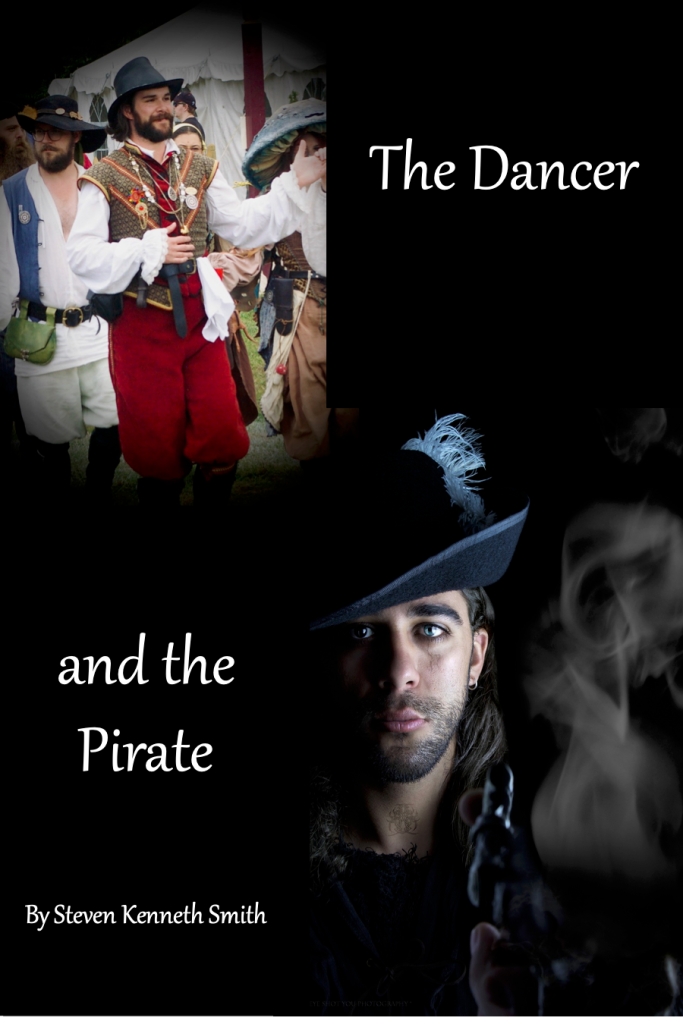
My romance novel is live on Amazon! It’s the story of two men who meet while working weekends at a Renaissance Festival. One of them, Allen, has for years been playing the field at the gay bar scene and hookup apps with no commitments. The other, Larry, is a college student looking for a relationship, but not adverse to having some fun in the meantime.
The sparks seem hotter than usual, but their relationship is complicated by an age difference and Larry’s mother’s alcoholism. And the fact that Allen is a heavy drinker himself.
Check it out on Amazon. Available in kindle and paperback format.
amazon.com/author/www.sksmithwriter.com
/
The Great Disruption
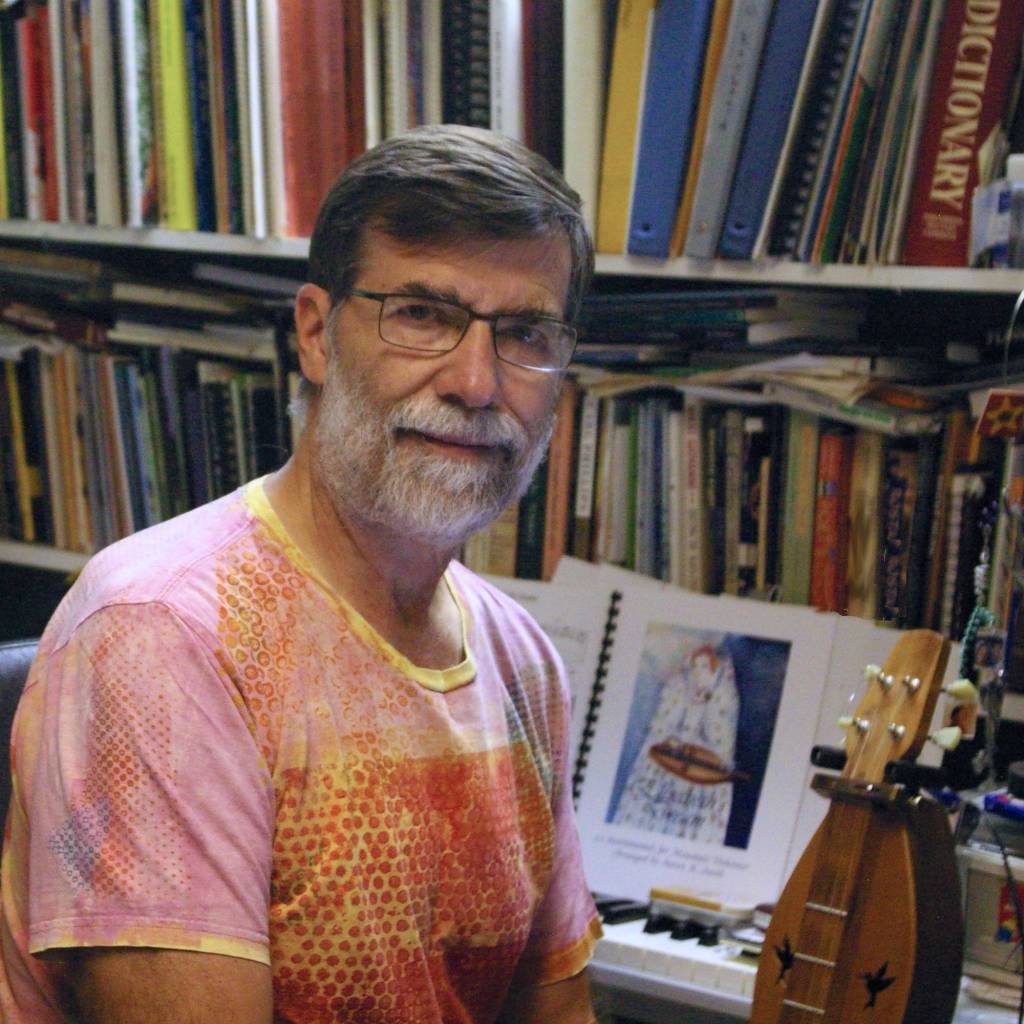
My novel, The Great Disruption, is now available from Amazon. You can find it on Amazon by Searching on the title, or my full name, Steven Kenneth Smith. Or you could try the link below:
amazon.com/author/www.sksmithwriter.com
As I mentioned in a previous blog post, current events caught up with the story before the book saw print. The novel is about the aftermath of a world-wide plague, one far more deadly than the corona-virus pandemic. It was universally fatal to everyone who contracted it, though it had no symptoms for five or six days. During the asymptomatic phase the virus was transmissible. People who gathered in crowds spread the virus among themselves, and later died.
Not to make myself sound like Nostradamus, but gee, that sounds similar to the corona-virus currently afflicting us, except for it being universally fatal. Well, I started writing The Great Disruption in 2015, and the first draft was complete around 2018. Laurie Garrett, in her non-fiction book, The Coming Plague, described this sort of behavior for pandemics back in 1994. The Spanish Flu pandemic of 1918 behaved in much the same way. In my novel I didn’t invent those characteristics as convenient plot devices. They’re well known as the way diseases can act.
In my novel the pandemic has burned itself out by the start of the story, though the characters are still wary of it. “My” plague does have convenient-for-the-plot characteristics in that there are no animal reservoirs for the virus, and it cannot survive outside a living body for more that a few minutes. Once the number of hosts becomes too small, the virus becomes extinct.
Here’s an excerpt from the novel. In it, several members of a community of survivors are cleaning up the house where a traveler to the community had been quarantined. He didn’t survive the quarantine period, but he didn’t die of the plague. It’s from Chapter 12 — Burial Detail. Hope you enjoy it and check out the book.
A week following Thanksgiving Jonathan volunteered to join the crew to remove Erik’s body and clean up the guest house. After seven days following Erik’s death, cleanup would be a grim job, but any plague virus would be gone by that time. There were four of them, all dressed in plastic coveralls, masks and latex gloves. It was a relatively warm day for early December, above freezing at least, and the sky was clear.
Three of them entered the house and fanned out, looking for the body and opening windows as they went, while the fourth, Bill Stevenson, built a fire in the yard to heat wash water. After less than a minute, while Jonathan was in the bedroom, Dan Kiner shouted. “Found him. He’s in the bathroom.”
The rest of them crowded into the small room. Erik’s remains lay curled up on the floor of the shower, fully clothed, badly decayed. Concentrated in the little bathroom, the stink caused them to gag and their eyes to water.
Jamal brushed a dreadlock from his face as he bent to peer at the body. “Well, dead is dead, I guess, but it doesn’t look like he died of the plague. There’d be blood stains around his mouth and nose in that case.”
“The hair loss and the nausea he reported are characteristic of radiation poisoning, according to the research I did recently,” Jonathan said.
Dan nodded. “I’m glad he came to the bathroom to die, at least. That’ll simplify the cleanup. Remember the one who didn’t make it a year ago last August? We had to burn the mattress.”
Jonathan tasted bile trying to come up in his throat. He swallowed hard. “I’m sorry, but I’ve got to get some fresh air.” He hurried out of the house, then walked across the yard to stand by the fire, where Bill Stevenson stood with a couple of jerry cans of water nearby. Bill poured one into a cauldron hanging from a tripod over the fire as Jonathan walked over to the fire-pit. Some plastic buckets, a pile of rags, a couple of mops, and some scrub-brushes lay on the sidewalk near by.
“How bad is it?” he asked as Jonathan approached.
“Jamal says he didn’t die of the plague. The stink was getting to me, but I guess it’s not as bad as it could be. He died in the bathroom, lying in the shower.”
Bill nodded. “Nice of him.” He poured another jerry can of water into the cauldron.
Jonathan only nodded in response. Just the sight of the corpse had made him squeamish. This rather surprised him. He’d seen many dead bodies before, two of which he’d killed himself. Those were ones who’d been threatening him and Sara, though. At least, he’d had every reason to believe that at the time.
Seeing Erik’s body was different. He’d spent time talking to him on the radio, getting what information he could about the dirty bomb attacks so he could research the extent of the contamination. He’d come to like Erik, at least a little, and he felt guilty that he’d made no attempt of help him. He knew that there was nothing he could have done without endangering himself, but that didn’t make him feel much better.
Bill put another log on the fire and straightened up, dusting his hands on his coveralls. “What’d you think of Allen?”
Jonathan turned back to Bill. “What? Oh, Allen Jacobs? He seemed okay. Why?”
“Oh, he’s a good enough guy. Folks seem to be put off by him, sometimes. Won’t join in any of the group functions, unless there’s food. Been a great help with his work at the farm, though. Saw you all sitting with him at Thanksgiving, and I wondered.”
Jonathan warmed his hands by the fire. “He seems, I don’t know, angry, or bitter, or something.”
“He’s got a right. He killed his wife.”
Jonathan’s face snapped up towards Bill’s. “What? Killed his own wife?”
Bill gave a single, grave nod. “She had sugar bad. When the plague hit they hid out in his hunting shack, but they didn’t have enough insulin. She went blind, then her foot started to rot. He tried to cut it off, but it didn’t help. Just got infected worse.”
“Oh God, what a terrible way to die. That wasn’t his fault, though. Sounds like he did his best to save her.”
“He shot her.”
“Oh.”
“Couldn’t stand for her to suffer, I reckon. She was twenty-eight.”
Jonathan stared down at the fire, and Bill stuck a couple more logs under the pot. After a moment he straightened up and continued. “Jim and Dan saw him digging the grave when they were out hunting, as I heard it. That was before I got here, back a year ago last July. Persuaded him to come back and mind the livestock. He doesn’t want to live in the village.”
“That’s—informative.” Jonathan tried and failed to imagine a scenario where he’d commit a mercy killing on Sara and then not turn the gun on himself afterwards.
Senseless Acts of Beauty
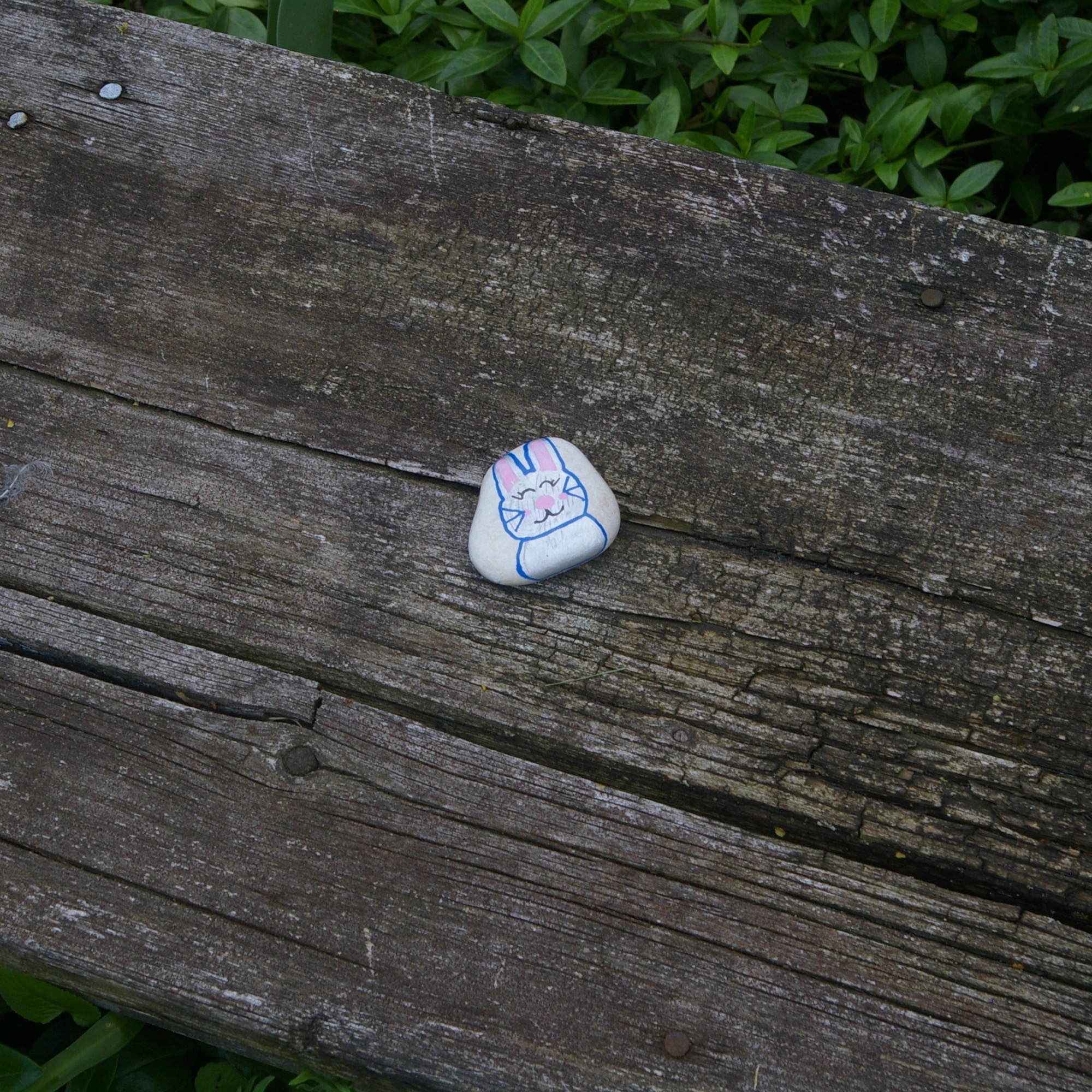
A few days ago someone left a small flat stone painted with a cartoon of a rabbit on the bench by my house. A few days later a similar one appeared on the pavers we’d set for the rubbish dumpster to rest waiting for the trash company to come empty it. This one was a picture of a butterfly.
I don’t know who left them, though judging by the artistic style, they’d been painted by the same person. I didn’t disturb them, and a few days afterwards they disappeared.
I rather like the mystery of this gift. It was unexpected, and therefore all the more welcome. It brought a smile to my face, something in itself welcome in these dark days. I don’t know if the person who left them there took them back, or if someone else walking by on the sidewalk picked them up and took them home. It doesn’t matter which, for if the original artist took them back I’ll assume they left those painted stones for someone else to enjoy. If a passerby took them, it’s obviously because they felt pleasure in seeing them, and wanted to keep that pleasure with them. I’m okay with it either way. The pleasure I received from them is already in my heart.
Most of you who have been reading these blog posts know that I’m a musician in addition to a writer. Maybe it’d be more accurate to say I’m a writer in addition to being a musician.
Whatever.
For some time since the pandemic hit I’ve been sitting outside my home on clear evenings playing music. Sometimes neighbors comment, and so far the comments have all been favorable. Occasionally passersby stop to listen for a while. Once I had a couple of young girls, maybe seven or eight years old stop and listen for several minutes. Keep in mind, I’m playing instrumental stuff, largely Renaissance era English and Irish music. John Dowland, Turloch O’Carolan, and such. Okay, O’Carolan is not technically Renaissance era, but I get away with it when I play the Ohio Renaissance Festival.
Anyway, after a bit one of them approached me an laid a flower on the bench beside me. I had to warn her to stay back, and for a moment I was afraid she was going to try to hug me. Even aside from the pandemic, that wouldn’t be a good idea in our paranoid society, especially since there was no obvious adult attached to her nearby.
I took the flower inside once I’d finished playing for the evening and put it in a vase. A daffodil. I kept it for at least a week, until it had faded and the petals had fallen off. One of my nicest gifts ever for playing music, even though it was a flower she had picked from my own garden.
Random Kindness, and Senseless Acts of Beauty. We need all of those we can get these days.
Check out my YouTube music videos at [email protected]
Science Fiction and the Difference
A hazard of writing science fiction is that actual advances in science often tend to overtake the fictional advanced science in the story, making it appear quaint at best, or laughably naive at worst. Thus we have novels with scenes set in interplanetary spacecraft where the pilots are using slide rules to plot their courses, or computers with human-like intelligence that have a memory “core” made of donut-shaped magnets strung on a grid of wires. As late as the 1980s there was limited realization among science fiction writers of how the internet would transform society. Sometimes that makes a difference in the story, sometimes not.
Science fiction writers are well aware of this. I remember reading an essay about the making of “2001, a Space Odyssey,” by Arthur C. Clarke once a long time ago, though I’ve forgotten where. In it, as I recall, he said that Stanley Kubrick had queried Lloyds of London about getting an insurance policy against the possibility that actual aliens would contact humanity before the movie came out, and thus render the plot obsolete. Clarke said that he had no way to know how they calculated the premium for the policy, but it was, appropriately enough, astronomical, so they went without this coverage.
As the great philosopher Yogi Berra once said, “It’s tough to make predictions, especially about the future.”
And so I watch with growing apprehension the spread of the novel Corona Virus, COVID 19, as it paralyzes China and spills over into other countries. As I write this, no one is able to predict how far the epidemic will spread, and statements from government officials have been contradictory. The human and economic toll is rising day by day.
There have been many science fiction stories written about the aftermath of a plague, Earth Abides by George Stewart, and The Stand by Stephen King are two examples that come to mind. I certainly hope those books remain fiction. I hesitate to mention, in the same paragraph as those other books, the novel that I’ve written, The Great Disruption, which I’m currently shopping around to agents, but it too is set in the aftermath of a world-wide plague.
I’m currently (March 2020) reading a fascinating book by Laurie Garrett, The Coming Plague. It’s not fiction, but parts of it read like a horror story. It turns out that plagues are not uncommon in our history. With the advent of antibiotic resistant strains of bacteria, novel strains of viruses appearing, and the ease of world-wide transportation, such plagues could well be a growing problem.
In my novel, the plague has ended by the opening, and the survivors don’t know if it was a chance mutation of a naturally occurring virus, or a biological weapon that backfired. That point is moot to the few who are left.
The corona virus currently afflicting China doesn’t have the characteristics of the one in my novel, but that point is likewise moot. Real people are suffering now, and I’ve donated to help the victims. A small gesture from my comfortable home in the United States, perhaps, but I hope that enough small gestures will add up to make a real difference.
You can read the opening of The Great Disruption at Embark Literary Journal, Issue 9, July 2019.
The Spider, the Fly, and the Bee
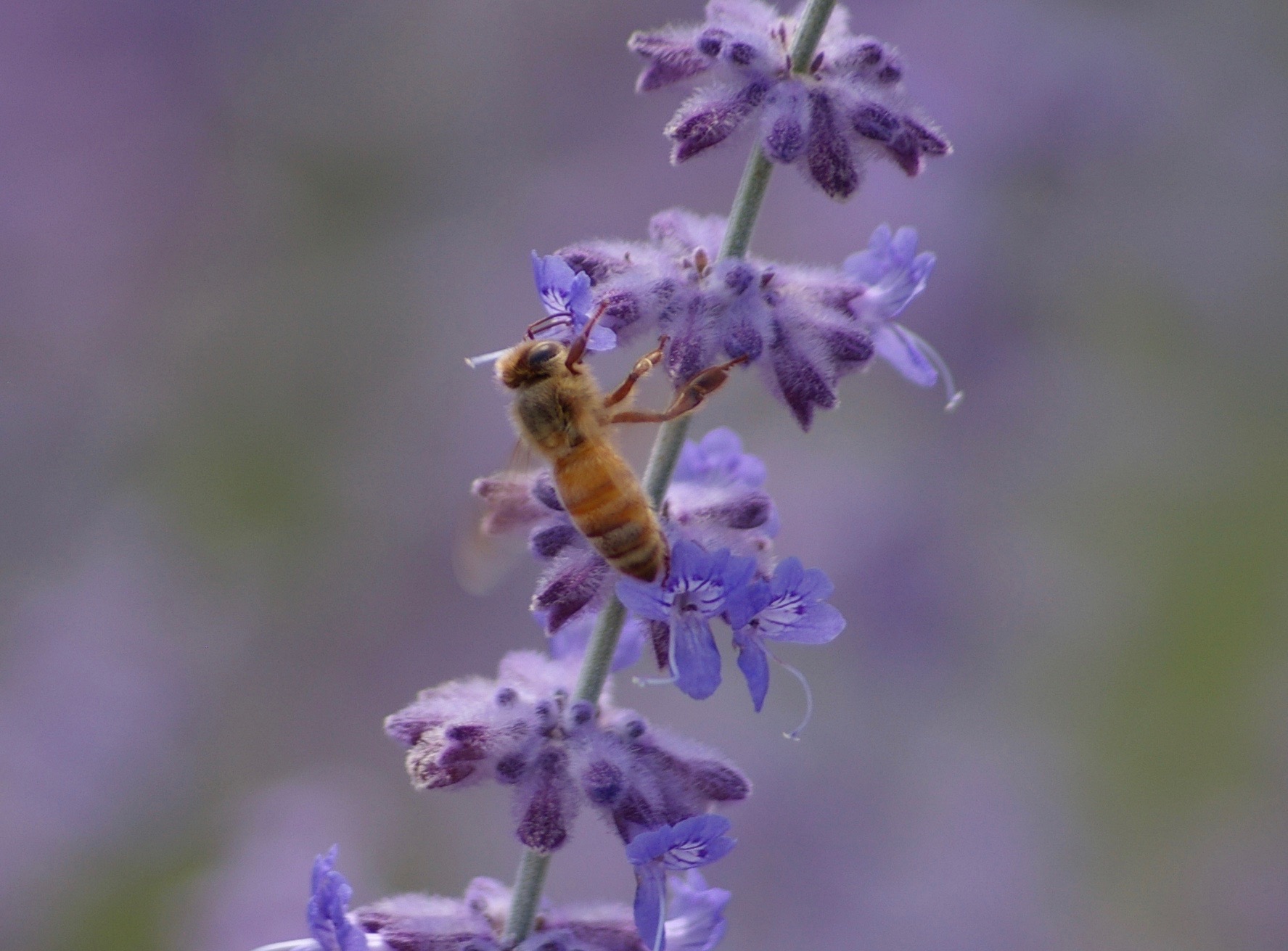
I’ve developed a routine of coming to a coffee shop in the mornings to work on writing or do some reading. This coffee shop is in a renovated late nineteenth century home and takes up almost the entire first floor.
I try to get there early, just after they open most days, and I have a regular table in the front sunroom right next to a large picture window. I’m there so often even the baristas have started referring to it as “my” table. When the sky is clear it gets sunlight in the morning as soon as the sun clears the roof of the Italian market next door. There are some shrubs along the house outside the window, so the window pane outside doesn’t get washed often.
During the last spring and summer I watched a funnel-weaver spider build a web outside in the lower corner of this window right beside my customary seat. Usually there wasn’t much of interest to see, but occasionally I got to witness a miniature natural drama play out there.
In my area—similar to many, I understand—honeybees are stressed and in decline. Though I encourage clover and other flowers on my lawn for pollinators, and I don’t use pesticides, seeing a honeybee has become sufficiently infrequent as to be a noteworthy sight. Late last summer as I entered a shop which had a flowering bush outside, I noticed what I at first thought were two honeybees. I quickly realized, however, that one of them was instead some sort of fly that mimicked the appearance of a honeybee. It hovered in a manner that honeybees don’t do and lacked the pollen sacs on its hind legs.
As I watched, the bee-mimicking fly dove at the real honeybee, striking it. The bee fell, convulsing, apparently dying as the fly hovered nearby. Horrified, I slapped at the fly, but of course there was nothing I could do for the bee.
My immediate impulse had been to protect the honeybee—who doesn’t love honey, after all?—but rationally, that predatory fly was just as much a part of nature’s web as the bee. Over the previous couple months I’d had no difficulty watching the spider outside the window by my seat at the coffee house capture flies and eat them. This, logically, was no different.
And yet it was.
I have to admit that I play favorites with nature. I love honeybees and butterflies. Parasitic wasps and carrion flies creep me out. I think a part of me could easily accept the loss of every mosquito on earth, or at least the sub-species of mosquitos that feed on mammalian blood and transmit diseases.
We need pollinators. Of course, several species of songbirds need mosquitos too, and I wouldn’t want to further stress them. As much as we’d like to, I don’t think it’s wise to pick individual winners and losers among insect species.
But yes. I love honeybees.
A few writing related news items to catch up on:
I had two poems published in “300 Days of Sun” the literary journal of the Nevada State College Humanities Department. The poems are “Super Nova” and “Gravity’s Embrace.” They’re in the lead position of the journal, pages one and two. Information about the journal is at https://300daysofsun.weebly.com/
Embark Literary Journal published the opening 4000 words of my novel, “The Great Disruption,” which I’m currently shopping around to agents. You can read the excerpt at https://embarkliteraryjournal.com/issues/issue-9-july-2019/
Here is the draft of the dust jacket blurb:
More than 99.99% of the population died in a plague. A chance viral mutation? A biological weapon? No one left alive knew for sure. But for a couple of years before the plague society was was increasingly torn apart by some mysterious pervasive illness that killed 80% of all boys before their first birthday, though girls were immune. Many suspected a rogue government actor was responsible.
Those who gathered to riot spread the plague and died. A few people hid from the rest of society and survived. Now they have to find each other and rebuild civilization.
Leaves of Ink published my poem, “It Could Have Been Beautiful.” It’s available online at http://www.leaves-of-ink.com/2019/09/it-could-have-been-beautiful.html
A Thousand Strangers
My last name is Smith.
Yes, you all know that, but there’s a certain burden that that entails that is sometimes difficult to express. As a dulcimer player, I’m constantly having to explain that I’m not the Steven Smith on http://www.everythingdulcimer.com who has posted hundreds of pieces of dulcimer music. I’ve only posted a few pieces there myself. You can tell us apart because I always use my middle initial, and he just uses his first and last names. I’ve met the other guy and his wife Jean a couple of times now. They’re great folk, and I’m glad to share a name with him. He’s a former national champion on both the mountain and hammered dulcimers, while I’m just a former regional champion on the mountain dulcimer.
There’s an excellent poet and artist in northern Ohio who shares a name with me, and a musician in the Cleveland area with not only my same first and last names, but my same middle initial as well. If you search on iTunes for Steven K. Smith, we both come up. I’ve corresponded with him and I have a couple of his albums. They’re very good.
I share my name with a professional football player, an astronaut, and a police officer in Columbus Ohio who was tragically murdered in the line of duty in the fall of 2016. I dedicated a poetry reading to him after he’d been shot, but before he’d passed.
While I was still a teenager I once had to prove to the local police that I was not the “Steven Smith” who had left a Boy Scout backpack with that name on it in a house that someone had broken into near my home. Seems that another Steven Smith around my age had loaned the backpack to some associates to whom he shouldn’t have.
I’ve heard that “Smith” is the most common surname in the English language. I don’t know if that’s true, but it’s beyond question that it’s very common. It doesn’t happen as often now, but when I lived in Columbus, Ohio, about twice a year I’d get a phone call that started, “Are you Steven Smith?” “Yes.” “Are you the Steven Smith that—.”
I was never the right one.
I was very glad for that once.
While still in college at Ohio State. I got one of those calls from a woman who was searching for her son, whom she’d lost track of some seventeen years previously. She thought he’d moved to Columbus and was going down the list in the phone book calling all the Steven Smiths, hoping to reconnect with her son. I apologized for not being the right one, and she said something like, “You know how it is, people move on and you lose track of them…”
I lied through my teeth and said that I understood.
It was winter, mid afternoon. I took my walking stick and went out hiking through the city, not returning until it was dark and my legs and fingers felt numb with cold and fatigue and my belly growled from hunger.
Some fourteen years after that, after I’d become sort of marginally known as a dulcimer player and composer, I wrote a song about that incident. There are some songs you write, and some where you feel as if you’re merely the portal through which the work passes. That was the case for this one. I was in a hotel room coming back from a conference relating to my day-job at the time and the song came out—both the words and music—in the space of a little less than an hour. I’ve done very little tweaking of it afterwards. I like to say the song took me an hour and fourteen years to write. I call it, “For Steven Smith, Wherever He May Be.” Here are the words:
For Steven Smith, Wherever He May Be
© 1994 SKSmith
The telephone rang, I heard a stranger’s voice say,
“Could you help me find my son?
I’ve been calling every Smith in this city of yours,
Could it be that you’re the one?”
“I haven’t heard from him in seventeen years
And lost track of where he’s been.
I think he went to Columbus Ohio,
I want to see his face,
I want to hear his voice,
I want to hold him once again.”
The longing in her voice echoed hundreds of things
That they never said out loud.
Like, “I’m sorry,” “I love you,” “I miss you, my son,
Please let’s not be over-proud.”
“I haven’t heard from him in seventeen years
And lost track of where he’s been.
I think he went to Columbus Ohio,
I want to hear his voice,
I want to see his face,
I want to hold him once again.”
I thought for a moment that I’d say I was he,
And that now her search was through.
But that intended act of kindness would have been a foul lie
And I couldn’t be that cruel.
I share my name with a thousand strangers
Linked by the anvil and the forge.
Touching each other in unintended ways.
Are you out there somewhere,
Lost in this city,
Longing for this mother of yours?
The telephone rang, I heard a stranger’s voice say,
“Could you help me find my son?
I’ve been calling every Smith in this city of yours …
Well, maybe he’ll be the next one.”
I rarely perform this song. I’ve had people leave the room in tears when I sing it, and I often have trouble getting through it myself. I’ve never recorded it.
I hope that woman and her son reconnected in a joyful reunion. I have no way of knowing whether that happened or not, but I have to believe that they did. Of the myriad possibilities that time and space spin around us, I really want to live in the one in which this mother and son reunited.
Basketball
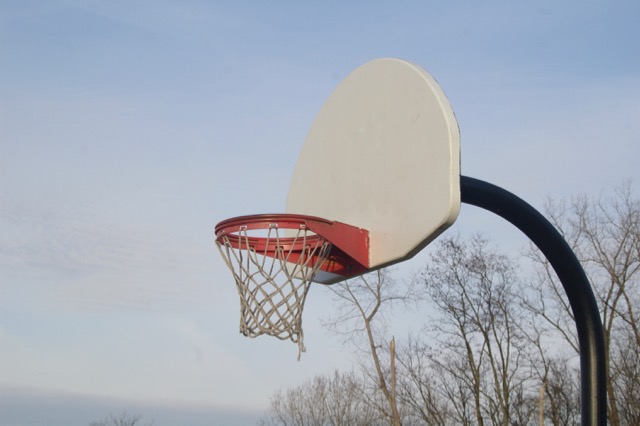
In 1972 I went to school at Lakewood High, near Hebron, Ohio. I was in the tenth grade. It was a mostly rural, tight-knit community, and our family had moved there only a few years previously. I was still an “outsider.” This was not helped by the fact that I was overweight, didn’t particularly like sports, either playing them or watching them, and tended to read a lot of science fiction. Even worse, I played chess at lunch periods and home-room with a couple of the other semi-pariahs.
Gym class was the bane of my existence at that time. If I could manufacture an excuse to get out of it, I did. I hated Phys. Ed. to the extent that the previous year, when I’d broken a bone in my foot in an accident playing basketball, I was sorry to get the cast off because that meant I’d have to attend gym class again.
Phys. Ed. was usually some semi-organized sport of some kind: football in the fall, basketball or volley ball in the winter and spring, for example. I did try to participate, I just wasn’t that good at it, and wasn’t terribly motivated to improve.
It’s something of a contradiction, then, that one of my most pleasurable memories of that year at Lakewood High involved a brief, offhand exchange that occurred in gym class during a basketball game.
My assignment for the game was to guard another player on the opposing team, and try to keep him from getting the ball, or scoring with it if he did. This was called, “sticking your man.” Which, I suppose, was a shortening of the phrase, “sticking to (or with) your man.” If I got the ball I was supposed to pass it as soon as possible to one of the more capable players.
The one who was the designated “captain” of our team would call time outs to discuss game strategy every once in a while. I don’t remember his name, but I don’t recall that he was one of the boys on the school’s basketball team. A lower-echelon player, if so. I usually wasn’t addressed in these discussions. One time, however, right at the end of one of these conferences, the captain turned to me and said, “You’re doing a good job of sticking your man.”
I said, “Thanks.”
It’s certainly not my only memory of Lakewood High, but it is one of the clearest, after about forty-five years.
The following summer we moved and I went to Newark (Ohio) High for the remainder of my high school career. I had fulfilled my requirement for P.E. by then, much to my relief, and Newark High had an actual chess team that played tournaments with other schools.
Perhaps ironically, at that point I got interested in exercise in a big way, in the form of bicycling. I never became a bicycle racer, but I did do many club rides and a number of long bicycle tours, and joined the League of American Wheelmen. (Now the League of American Bicyclists.) I lost the excess weight and generally spent more time outside in physical activity. What high school Phys. Ed. couldn’t accomplish, I did myself, in my own way. While I never did gain much interest in basketball, that forgotten P.E. class basketball team captain did show me that it’s possible to feel good about doing something purely physical.
Thank you.
